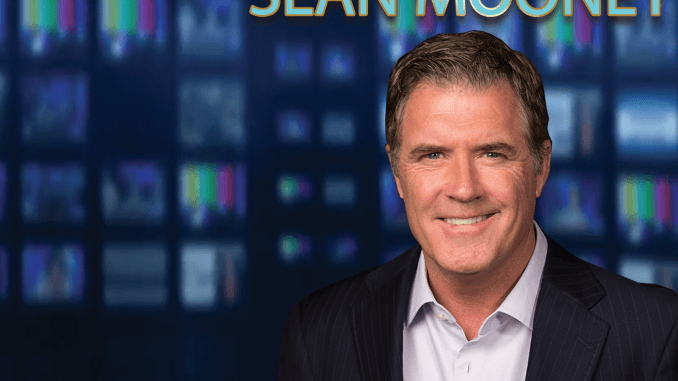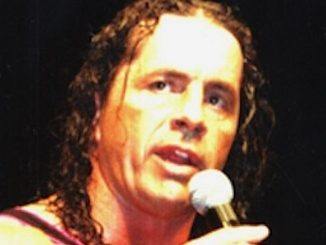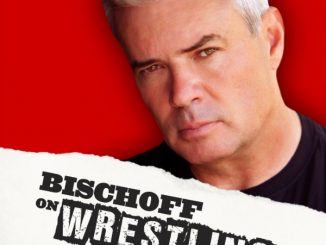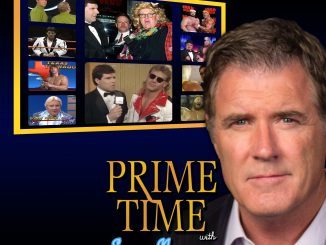
Show Name: Prime Time with Sean Mooney
Episode Title: Episode 20: The Million Dollar Man Ted DiBiase
Release Date: 11/01/2017
Guest: Ted DiBiase
Recap by: Evan Polisher
DIRECT LINK TO LISTEN/DOWNLOAD
Episode Highlights
- Ted’s mom and stepdad were both wrestlers.
- His stepdad would pass away when Ted was just 15.
- He went on to play football at West Texas State, before leaving school to focus on wrestling full-time. He was a natural and wrestling came easy to him.
- He was Hulk Hogan’s very first opponent.
- He believes Vince gave him the Million Dollar Man gimmick due to the way he carried himself as a heel.
- Ted got caught up in the lifestyle, turning to alcohol and drugs and becoming unfaithful to his wife.
- He would work to repair his marriage and devoted his life to God.
- After a stint with WCW, Ted would leave the wrestling industry in 2000 to focus on his ministry.
Introduction (0:10)
Sean reflects on last week’s episode, which featured his brand new show format and first guest, Bruce Prichard. He thanks the “King of Podcasts” for joining him and covering topics that had never been covered before, not even on Bruce’s podcast, Something to Wrestle.
Sean promises that there are more great guests already in the pipeline for future episodes, many of which he has not talked to in decades. As is the case with this week’s guest, as Sean welcomes WWE Hall of Famer, The Million Dollar Man Ted DiBiase.
The Early Days (5:57)
Ted grew up around the wrestling business. His mother was a wrestler and his stepdad, Mike DiBiase, who came into Ted’s life when he was 5, had a storied amateur and professional wrestling pedigree. Mike was a great role model and someone Ted aspired to be like when he grew up, although it was made clear that he did not want Ted to grow up to be a wrestler and get caught up in the lifestyle of the wrestling business.
Ted’s biological father, a professional singer, was estranged from the family and was not a big presence in his life.
At the age of 15, with one year of amateur wrestling under his belt and his relationship starting to blossom with his stepdad, Mike passed away. Ted’s mother sank into despair and turned to alcohol. She ended up remarrying his biological father and moved to California with Ted’s younger brother, but Ted did not go, instead moving to Willcox, AZ to live with his grandparents.
As fate would have it, a wrestling promotion out of Amarillo, TX featuring Dory Funk Jr. and Terry Funk, would soon come to Arizona. That is where Terry would convince Ted to go on a recruiting trip at West Texas State, where he would ultimately attend and play football. West Texas State served as a breeding ground of sorts for great professional wrestlers, with Dusty Rhodes, Tito Santana, Bruiser Brody, Stan Hansen, Tully Blanchard, having all attended.
While playing football at West Texas State, it was quickly evident that an NFL career was not in his future. “We’re going to have to start timing you with a sundial,” his coach would tell him.
Breaking into the Wrestling Business (21:17)
One day, Terry Funk would call Ted and ask him to serve as a referee at a show in Lubbock, TX. This happened to be the same town and building where his stepdad died. “This is where my dad left off and I’m picking it up,” he said. Ted would go on to referee that whole summer for the Amarillo territory, which allowed him to really start learning the psychology of wrestling.
Not long after, Dick Murdock told him that he could likely get him booked with promoter, Bill Watts, who Ted would later go on to say was one of the greatest wrestling minds ever and whom he owed much of his success in the business to. Luckily, the NCAA had just changed a ruling that would allow Ted to go wrestle, while maintaining his amateur status to play football. So he started with Bill Watts in the summer of 1975 and wrestling went so well, not to mention a little money in his pocket, that he never went back to school, despite being only a few credits away from a degree.
Ted loved wrestling. It came easy to him and many felt he was a natural.
Sidebar – Not Clint Eastwood (25:35)
Fast-forward to 2005. The WWE wanted him to come in to be a part of the creative team. Ted told them he wasn’t Clint Eastwood, who was good on both sides of the camera.
Ted wasn’t the storyteller. You tell him the story and he could go out there and make it happen, both in the ring and on the mic. But, like many other wrestling greats, he had difficulty explaining to others how to do it, as everything seemed to come so natural to him.
The WWWF (28:33)
In December of 1979, during a brief stint with the then WWWF, Ted would square-off against Hulk Hogan his very first match. Ted was actually the babyface, and Hulk the heel, in the match.
Being Ted’s last match with the promotion before going back to Mid-South, he did the job and put Hulk over – something that Hogan was very grateful for.
The Million Dollar Man (33:20)
Ted would return up north to the WWF in May 1987. At that time, Vince had the “Million Dollar Man” gimmick in mind and the only question that remained was who would play the character? Ted believes Vince saw him as the right choice for the Million Dollar Man gimmick because of the way he carried himself as a heel. Rather than a “tough guy” heel who inevitably wins the crowd over and turns babyface, like The Rock and Stone Cold Steve Austin, Ted carried himself as a “chicken s***” heel – a bully, yet a coward. This heel persona fit the Million Dollar Man character that Vince had envisioned.
Sean suggests that Ted had to carry his character further than anyone had before. He would live the character in and out of the ring – staying in 5-star hotels, flying first-class, and having thousands of dollars in “flash cash.” Only when he returned home from the road would he be able to relax and just be Ted again.
Virgil (39:11)
They both agree that you could not get away with the Virgil character today.
Ted thinks Virgil appreciated the spot and the opportunity he was given. Virgil also had an unbelievable look, kept himself in great shape and never drank, smoked, or did drugs.
Despite not being “the smartest book in the library,” Virgil and Ted got along just fine throughout their run together.
Vignettes (40:53)
Many of the classic Million Dollar Man vignettes – driving fancy cars, sitting poolside at the mansion – were, in fact, Vince’s property. And everyone, including the crew, had a blast shooting them.
Of all the classic vignettes, promos and segments that Ted did over the years, the one that he gets asked about more than any other was the infamous basketball segment, which got nuclear heat from the crowd.
Like Rockstars (43:40)
Ted reflects back on his meteoric rise to the top of WWF – playing a critical role in the Andre and Hulk feud leading up to WrestleMania IV and then wrestling Macho Man at WrestleMania IV, essentially turning Randy babyface – among his fondest memories.
During Ted’s era, the boys became rockstars in just about every capacity, and were treated as such by fans. The pace was so intense, to the point where he would forget what city he was in at times. This brutal pace and travel schedule kept him away from his family a majority of the time. And when the show ended, and he would return to his hotel room, there was nothing left to do but head down to the bar. Then injuries would pop up, and he would find himself taking pain killers on top of the beer. Then cocaine and other drugs and other women entered the equation.
It got to the point where Ted was essentially living two different lives. Although he loved his wife and children, he explains it as trying to fill a void in his life when he was on the road.
The Door Slams Shut (53:17)
Right after WrestleMania VIII in Indianapolis, IN, Ted would fly to Detroit and call home. Waiting for him on the other line was “hell,” as his wife had discovered many of the things he had been doing, by looking at phone records. In that moment, he realized he had put at risk the most valuable possessions in his life – his wife and children – all for an ego trip. “What would my dad have thought,” he asked himself. Despite all the fame and success he had achieved, his did would have been so disappointed.
He would begin to work at rebuilding his life and his marriage, first and foremost by dedicating himself to God. He would leave the WWF about a year later because he realized he needed to separate himself from that environment and lifestyle.
Although his wife knew he was sorry and had forgiven him for what he had done, she did not know if she was strong enough to stay. He promised that if she gave him another chance he would become the man that she married – a man of strong character and integrity, the spiritual leader of their house and one day, God willing, regain her trust and respect. The next two years of his life were hard, as he tried to prove himself to his wife. As she slowly started to see the priorities shifting in his life, he began to rebuild that trust and respect.
Ted DiBiase Jr. (1:05:06)
Sean and Ted discuss Ted Jr.’s decision to get into the wrestling business. What Ted had gone through in his own journey notwithstanding, he knew he needed to support Ted Jr. in any decision that he made and allow him to experience the business for himself.
Despite a very successful run with the WWE, Ted Jr. walked away from the business in his prime, because he experienced first-hand the demands that the business put on him, which would not allow him to be the husband and father he wanted to be.
End of Wrestling Career (1:13:14)
When Ted left the WWF, it was not because he was unhappy with the company. Rather, he was hesitant to go back on the road and get caught up in the lifestyle again.
After leaving WWF, he would find his way down south at WCW. Despite a guaranteed contract during his time there, he does not look back fondly on his years with WCW. “It was a poorly run organization,” he said.
Ted ultimately left the wrestling business in 2000 and has been primarily focused on ministry ever since.
Wrap Up (1:17:50)
Sean thanks Ted for joining him this week and teases next week’s guest, Mean Gene Okerlund, who will discuss their time together in the WWF/WWE.
Episode Rating 7.5/10
Following his first show in its new format, Sean delivered another solid episode. Ted’s journey and storytelling had an easy, logical flow to it. And Ted’s voice was built for radio/podcasts, which made it an easy listen. I would have personally liked a few additional WWF stories mixed in, but overall, solid.
About the Author
Evan has been a wrestling fan since the age of 5, growing up on late ‘80s and early ’90s WWE, into the Attitude Era and all the way through to the current product. Evan’s fondest memories include catching Razor Ramon’s toothpick at an early episode of Monday Night Raw at the Worcester Auditorium, and witnessing history at the Worcester Centrum as Mick Foley captured the WWE Championship for the first time. A social media and digital marketing guy by day, Evan and his family currently reside in Rutland, MA. Twitter @evanp18.




Be the first to comment